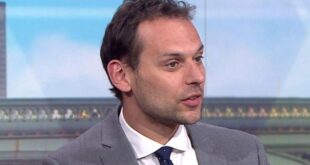Presidents and prime ministers have continued to descend on the United Arab Emirates from around the world to pay their respects to the federation’s late ruler.
The first Western leader to arrive in the oil-rich emirate was French President Emmanuel Macron.
On Sunday he met new ruler Sheikh Mohammed bin Zayed Al Nahyan to pay tribute to Sheikh Khalifa bin Zayed Al Nahyan, who died on Friday at the age of 73 after years presiding over the country’s rapid transformation into a global business hub and regional power centre.
Prime Minister Boris Johnson was expected to arrive later on Sunday to offer condolences, along with other leaders including Israel’s president after the two countries opened formal relations in 2020.
An American delegation led by Vice President Kamala Harris is due to visit the UAE on Monday, in a bid to ease tensions and show support as relations between the countries have strained under President Joe Biden.
“He was respected by all for the values of peace, openness and dialogue that he embodied,” Mr Macron wrote on Twitter of Sheikh Khalifa, expressing “full support” for the ascension of his half-brother Sheikh Mohammed after rulers in the federation unanimously appointed him as president.
As crown prince of Abu Dhabi, Sheikh Mohammed has served as the nation’s de facto leader since Sheikh Khalifa suffered a stroke in 2014. He has turned the small UAE — population 10 million — into an influential state.
Paris and Abu Dhabi have become increasingly aligned in recent years, sharing a mistrust of Islamist movements such as the Muslim Brotherhood across the region, including in Turkey and Libya.
France opened a major overseas naval base in Abu Dhabi. French warplanes and personnel are also stationed at a facility outside the Emirati capital. The two governments jointly built a branch of the Louvre museum in the emirate.
During Mr Macron’s visit to Dubai last December, France clinched its biggest overseas order for its Rafale combat jet with the UAE — an $18 billion (£14 billion) deal that came as a planned US sale of advanced F-35 fighter jets to the UAE stalled in part over American concerns about the Emirates’ relationship with China.
Sheikh Mohammed’s assertive foreign policy in the Arab world was on display as allied leaders expressed sorrow over Sheikh Khalifa’s death and congratulated Sheikh Mohammed on his formal ascension to power.

Among the first was Egyptian President Abdel Fattah el-Sissi, the Egyptian general who, with Gulf Arab support, overthrew an elected but divisive Islamist government in 2013.
Emirati-backed Tunisian President Kais Saied also flew in to pay tribute, along with Jordan’s King Abdullah II and Iraq’s president and prime minister.
Sudan’s Abdel-Fattah Burhan, the general who led the coup in the east African nation last year, has made frequent visits to key backer Sheikh Mohammed. He posted footage on social media Saturday sprinting up stairs to board his plane to Abu Dhabi to honour the late Emirati president.
The UAE’s recent deal to normalise ties with Israel is also indicative of Sheikh Mohammed’s assertive foreign policy. Before Israel’s largely ceremonial President Isaac Herzog took off for Abu Dhabi on Sunday, he offered words of gratitude for the Emirates’ leaders.
“The partnership between our countries is an asset for us and for the whole region and it has been built and is still being built by bold and groundbreaking leaders,” he said.
Meanwhile, Saudi Arabia’s Mohammed bin Salman delivered his condolences on the phone.


